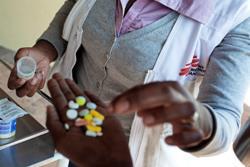Mpumalanga district holds first “pride parade”


Drawing more than 100 participants from four local municipalities, the march was aimed at promoting understanding and combatting violence aimed at the LGBTI community.
“We are all protected by the South African Constitution and no one is above the law,” said Thandi Maluka from the Sexual HIV Prevention Programme, which works to stem new HIV infections by ensuring that a combination of HIV prevention methods are available to South Africans.“The Bill of Rights recognises and protects all South African citizens, irrespective of race, gender or sexual orientation, against any form of abuse or discrimination.”
For many of the marchers, the event was an emotional one in light of the recent media reports on the continued “corrective” rape and murder of lesbians. In August, media reported on the murder of 18-year-old Gift Makau who was found dead in Mahikeng, North West. She had reportedly been raped and strangled with wire. A shoelace and a hosepipe had also been shoved into her mouth.
About a month prior, 26-year-old Duduzile Zozo was found murdered outside Johannesburg. A toilet brush had been inserted into her vagina. According to media reports, Zozo’s mother believed her daughter had been murdered because she was a lesbian.
“No human being deserves to be killed or raped just because some people don’t approve and accept their sexual preferences,” said Cindy Molefe, an LGBTI activist from Limpopo who attended the march. “Our voices and weeping must be heard.”
Stigma means survivors suffer in silence
[quote float=”right”]Sizwe Buthelezi said he was gang raped at party two years ago. He believes he contracted HIV during the rape and says friends warned him to keep quiet about it
Molefe added that many in the LGBTI community do not report rape because they fear being judged and blamed.
Sizwe Buthelezi from Nelspruit said he was gang raped at party two years ago. He believes he contracted HIV during the rape and says friends warned him to keep quiet about it.
“When I wanted to report the case my best friends advised me not to do so because the police would suggest that I was the one who provoked my rapist,” he said.
Rape survivors should report to their local health facility as soon as possible and no later than 72 hours after being raped to be tested for HIV. If they are HIV negative, they will be given a short course of antiretrovirals to protect them from contracting the virus.
Siyabonga Zulu said that he did not expect everyone to accept his sexuality but that he did expect his rights to be respected.
“If I choose to sleep with a man, no one has the right to judge me or try to fix me,” Zuu told OurHealth. “You don’t have to accept or like it but it’s my choice.”
“All I ask is for you to understand and allow me to leave my life to the fullest,” he added.
Community elder Ronny Ngobeni said that in many ways, the discrimination felt by the LGBTI community today reminded him of that endured by people of colour under apartheid.
“Our country has fought for freedom because we were oppressed by our past government, but I can see we still have a long way to go,” he said. “If it was so important to live in a free, democratic country, I don’t understand why our children keep killing and oppressing their brothers and sisters just because they are different.”
Author
Republish this article
This work is licensed under a Creative Commons Attribution-NoDerivatives 4.0 International License.
Unless otherwise noted, you can republish our articles for free under a Creative Commons license. Here’s what you need to know:
You have to credit Health-e News. In the byline, we prefer “Author Name, Publication.” At the top of the text of your story, include a line that reads: “This story was originally published by Health-e News.” You must link the word “Health-e News” to the original URL of the story.
You must include all of the links from our story, including our newsletter sign up link.
If you use canonical metadata, please use the Health-e News URL. For more information about canonical metadata, click here.
You can’t edit our material, except to reflect relative changes in time, location and editorial style. (For example, “yesterday” can be changed to “last week”)
You have no rights to sell, license, syndicate, or otherwise represent yourself as the authorized owner of our material to any third parties. This means that you cannot actively publish or submit our work for syndication to third party platforms or apps like Apple News or Google News. Health-e News understands that publishers cannot fully control when certain third parties automatically summarise or crawl content from publishers’ own sites.
You can’t republish our material wholesale, or automatically; you need to select stories to be republished individually.
If you share republished stories on social media, we’d appreciate being tagged in your posts. You can find us on Twitter @HealthENews, Instagram @healthenews, and Facebook Health-e News Service.
You can grab HTML code for our stories easily. Click on the Creative Commons logo on our stories. You’ll find it with the other share buttons.
If you have any other questions, contact info@health-e.org.za.
Mpumalanga district holds first “pride parade”
by cynthiamaseko, Health-e News
September 11, 2014



